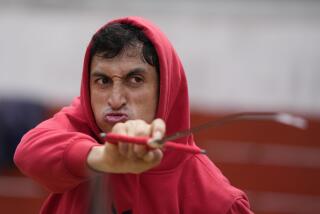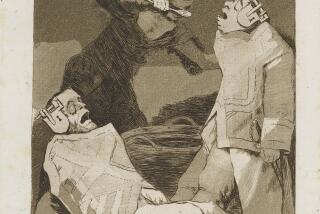Back in the early days of 19th...
Back in the early days of 19th Century in Spain, bullfighting was the big sport and matadors such as Martincho, Pepe Illo and Pedro Romero were the Charles Barkleys of their day.
Since photography hadn’t been invented yet, there weren’t any trading cards or door-size posters of these guys grinning with bull ears in their hands. But there were etchings, including artist Francisco de Goya’s series of 33 called La Tauromaquia, on display now at the Norton Simon Museum in Pasadena.
Published in 1816, when Goya was 70, the series depicts the corrida, or bullfight, from its earliest pre-Christian days to Goya’s present, and features the big names of his time.
According to notes from the museum, bullfighting began when hunters tried to bring home a big one for the pot. When the Moors showed up in the 8th Century, they took to the sport and even came up with the idea of confining it to a ring, as illustrated by six of Goya’s engravings.
Modern bullfighting became popular in the 1700s, with Goya’s life span, 1746 to 1828, roughly coinciding with the sport’s “golden age” in the latter half of the
Goya apparently was a fan himself, with themes from the corrida popping up all through his numerous paintings, drawings and prints.
The Norton Simon exhibit has all 33 etchings that were in the first edition, as well as seven prints from the 11 plates that Goya
engraved but rejected when it came time to publish the work.
Samples from a fourth edition, published in 1905, are on display, too, along with hand-colored
The museum notes that La Tauromaquia was not a commercial success during Goya’s lifetime. Maybe it’s because there wasn’t any bubble gum.
The museum, 411 W. Colorado Blvd., is open noon to 6 p.m. Thursday through Sunday. Admission is $4 for adults and $2 for students and senior citizens; children under 12 are free.
More to Read
Sign up for The Wild
We’ll help you find the best places to hike, bike and run, as well as the perfect silent spots for meditation and yoga.
You may occasionally receive promotional content from the Los Angeles Times.






